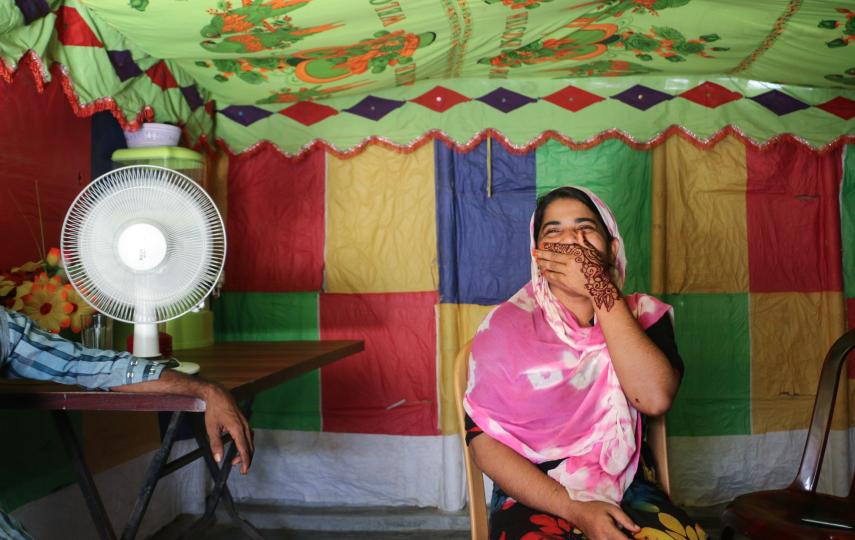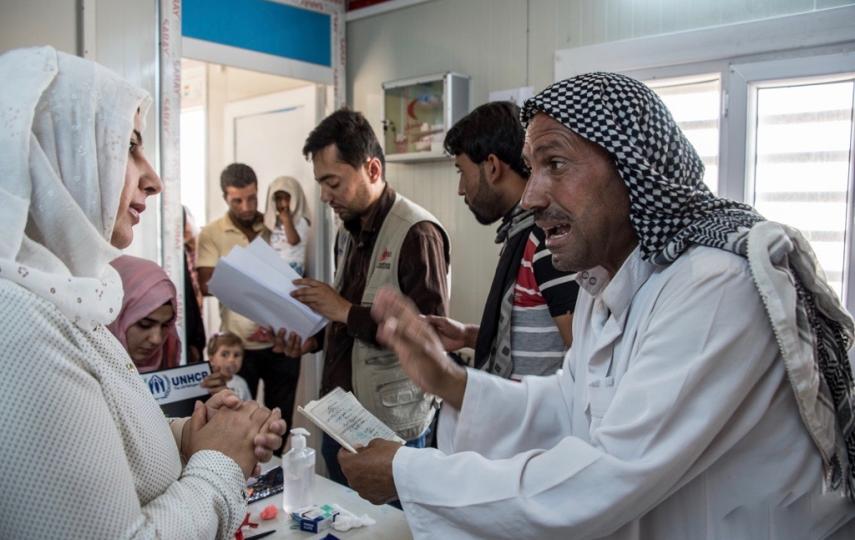Abdulrahman spent months searching for justice after his young daughter was assaulted. But it’s frustratingly elusive in Bangladesh’s Rohingya refugee camps – city-sized settlements with no formal criminal justice system.
He wants punishment for the man his family accuses of sexually assaulting their daughter in early 2018. Like them, the man is a Rohingya refugee living in the same camp in southern Bangladesh.
“We don't get any solutions,” said Abdulrahman*, drawing an exhausted sigh as his daughter played in the dirt outside their bamboo-and-tarpaulin home. “We sit in the house, waiting and seeing nothing happen.”
Nearly one million Rohingya live in Bangladesh’s packed Rohingya camps, forced to flee their homes in Myanmar’s neighbouring Rakhine State by successive military crackdowns, including the violent purge of more than 700,000 people in 2017.
They have almost no access to Bangladesh’s formal justice system. Instead, refugees rely on an informal system that critics say has serious limitations – especially for women and girls facing sexual and gender-based violence.
“We don't get any solutions. We sit in the house, waiting and seeing nothing happen.”
The process involves unelected Rohingya leaders known as majhis, mosque committees, and appointed government officials overseeing individual camps. They deal with everything from theft and disputes among neighbours, to domestic abuse and sexual violence.
It’s a patchwork system focused on managing conflict rather than delivering justice for serious crimes. Few women are involved, and abuse of power among the predominantly male majhis is rampant, said Patrick Sooma, protection and rule of law coordinator for the International Rescue Committee (IRC) in Bangladesh, which carried out a 2019 survey of access to justice among refugees and local communities.
“The informal system often fails to provide adequate justice for women,” Sooma said.
Chekufa, who heads the Rohingya Women’s Empowerment and Advocacy Network, a refugee-led organisation in the camps, said that in domestic violence cases women are usually encouraged to stay silent, and to not take complaints to officials.
The coronavirus pandemic has pushed justice even further out of reach, especially for women. The government in April ordered all but essential services to be scaled back to contain the virus. There are fewer humanitarian staff in the camps, including aid workers who can offer legal advice or protection, and rights groups say overall conditions have deteriorated.
Women face “inequitable and unfair treatment” in domestic disputes and divorces mediated by the majhis, the UN’s refugee agency said in a mid-August report, warning that “some majhis are increasingly playing a negative role in the community”.
Gatekeepers
Under the camps’ informal justice system, a mosque committee known as a shomaj first hears the case. If it can’t reach a decision, or the verdict is unacceptable to the parties involved, then the camp majhi weighs in. Local Bangladeshi government officials known as camp-in-charges, or CiC, are the final arbiter.
While Bangladesh’s regular criminal and court system can in theory handle serious cases, in practice, few make it that far.
Melissa Evleigh, a researcher who has led community consultations on justice in the camps, said the informal system is focused more on resolving disputes and maintaining social harmony. Punishment is often weak.
“There is no justice when things go wrong for Rohingya.”
In domestic violence cases, it’s common for survivors to be offered counselling, and for perpetrators to simply be asked to provide a written pledge to not repeat the violence.
“There is no justice when things go wrong for Rohingya,” she said. “There are various mechanisms, but these wouldn't result in justice.”
The mosque committees, majhis, and CiCs are overwhelmingly comprised of men. In cases involving sexual violence, many women are unwilling to even raise complaints in the first place, said Menara, a Rohingya women’s rights activist who uses one name.
“They don’t like talking about their cases because they worry about their honour,” she said.
Menara said she and her colleagues try to encourage women survivors to speak up by introducing them to female majhis, who take the complaints to male majhis.
However, even the camps’ few female majhis are rarely involved in the legal process.
“It is very rare that women get justice,” one female majhi told the IRC in the 2019 survey. “Males have power and money. With these they can buy the justice system.”
-
Refugees forgo justice to avoid confrontation
- Justice is also out of reach for Rohingya who have disputes with local Bangaldeshi communities.
- Tensions have grown between Rohingya and people from the surrounding communities as the refugee crisis wears on. Some refugees said their mosque committees discouraged them from making complaints, for fear of endangering relations between the two sides.
- Mohammed Zubair said he was knocked unconscious and had his ribs cracked when he was beaten by a Bangladeshi man who accused Zubair of staring at him.
- Months later, his injuries still caused him daily pain. At first, he wanted to pursue a case against his attacker. But his mosque shomaj committee convinced him otherwise.
- “I wanted to go to the CiC, but they told me not to,” he recalled. “They said we're living next to the host community, so sometimes we have to bear these pains.”
- When other refugees have disputes with their Bangladeshi neighbours, they’ve been told by Rohingya leaders to avoid trouble, he said.
- While Rohingya refugees generally express gratitude toward the army, many are wary of the police, who they believe have to be bribed in order to investigate crimes.
- “They're never on our side; it's always for the host community,” he said. “My search for justice made me realise that wherever I go, I will not find justice. So I've given up.”
Despite the informal system’s flaws, however, it has functioned as a way to resolve disputes within the community. The IRC survey found many Rohingya “overwhelmingly” prefer to find justice within the camps, rather than the Bangladeshi legal system.
This is partly due to familiarity. The majhi system, in which a single person is usually responsible for around 100 families, was adopted in Bangladesh's camps years ago and revived after the 2017 refugee influx rapidly expanded the population.
The mosque shomaj committees existed in Rohingya villages in Myanmar, where they were relied on to resolve disputes. There, as in Bangladesh, Rohingya also had extremely limited access to formal justice – mirroring broader curbs on citizenship, movement, education, and healthcare.
But disputes have magnified in Bangladesh, according to Syed Bashar, a shomaj committee member in the camps.
He said problems have become more common because of the refugees’ cramped living conditions and the mental health toll from government restrictions on movement and work.
“We try to solve problems by getting everyone to admit their faults,” he said. “We are human beings and we have to live with each other.”
A culture of impunity
If majhis, mosque committees, and the government camp-in-charges can’t find a resolution, cases can in principle be escalated to Bangladesh’s regular justice system.
The CiCs are the highest power in the camps and can grant permission for police investigations and to move cases to the formal legal system – usually after advocacy from legal aid NGOs.
However, Evleigh said that examples of cases successfully entering the formal justice system are rare, despite technically being possible.
She said human trafficking complaints are common, for example, but none that she knew of have been dealt with by the legal system.
“What really needs to happen to stop the culture of impunity is serious cases need to have a place to go,” she said.
Legal advocates and Rohingya say local prosecutors, facing their own backlogs, often refuse to investigate cases involving refugees.
For Abdulrahman, the refugee searching for justice for his daughter, both the informal camp process and Bangladesh’s criminal justice system have failed.
He appealed to camp authorities to arrest the alleged perpetrator, but had no response. Majhis or mosque committees couldn’t help him. Bangladeshi police ignored his complaints.
With the help of a legal NGO, the Bangladesh National Woman Lawyers’ Association, Abdulrahman tried to take the case to the local courts. But it stalled when a local magistrate refused to get involved.
The man he accuses of assaulting his daughter was never arrested; as far as Abdulrahman knows, he disappeared into the labyrinthine camps.
Abdulrahman still sometimes asks whether anyone has seen the man, but the father said he knows the case is unlikely to be solved, unless he finds the suspect himself.
“We are Rohingya,” he said. “So they don't want to listen to us.”
*Name has been changed to protect identity.
ka/il/ag






